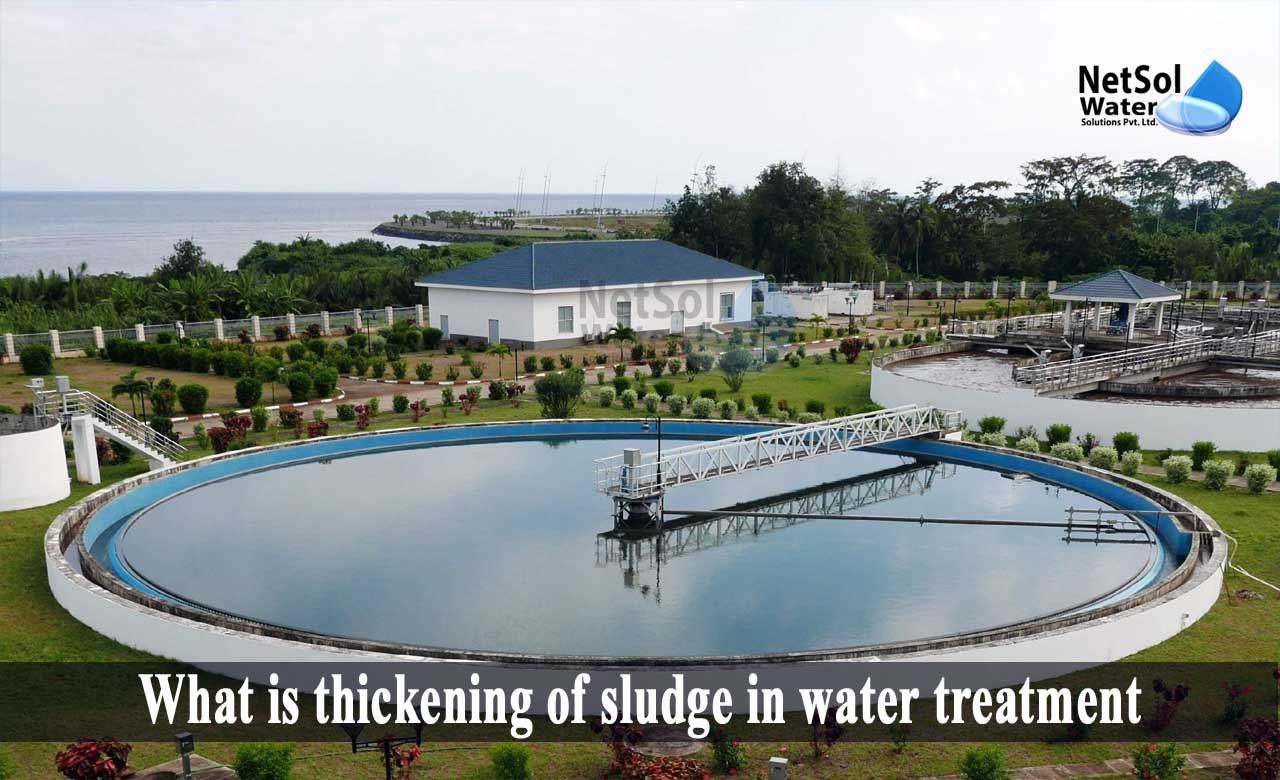Several procedures work just to remove water from the sludge in order to lessen its volume. The sludge gets more solidified as a result, increasing its suspended solids content. Depending on how much water is removed, these processes are referred to as thickening or dewatering of sludge.
What is thickening of sludge in water treatment?
It often includes bio-solids that have been separated from liquid sewage. Sludge thickening is crucial since it is the method used in wastewater treatment facilities, to raise the concentration of solids and lower the amount of free water. It reduces the workload on the subsequent steps, such as digestion and sludge dewatering.
Types of sludge thickening process
1: Gravity thickening
By allowing the particles to settle to the bottom of a vessel, creating a concentrated (thickened) stream that can be drained from the base of the vessel, and a supernatant (diluted) stream that can be drained from its surface, gravity thickening is achieved.
2: Centrifugal thickening
Centrifugal thickening is the process of causing particles to move toward the sides of a spinning container, under the influence of a centrifugal force, producing a clarified concentrate stream in addition to the thickened solids,assisting the neutrally buoyant particles in rising to the sludge surface, where they can be removed by
· Skimming (dissolved air flotation), or
· Allowing the liquid to pass through a permeable surface that the sludge lies on (a gravity belt), or
· Comes in contact with while draining under gravity (rotary drum thickening).
These procedures produce sludges with a 4–6% dry solids (DS) percentage, while using relatively little energy. They are frequently used to lower the sludge's solids content prior to anaerobic digestion.
What is the process of sludge thickening?
The thickening of sludge involves a number of different procedures. Each is influenced by the downstream process, the wastewater treatment facility's size, and the accompanying physical constraints.
Gravity thickening is the process of concentrating thin sludges into a more dense sludge product, utilizing specialised circular tanks. This method of water clearing has a drawback in that it primarily treats surplus watery sludge produced, by the activated sludge process.
Tanks for thickening have vertical paddles that move slowly. Sludge enters the thickening tank where it finally drains extra water from the particles, which are accumulating at the bottom. Similar to the tanks, a gravity thickener uses a similar technique, but it is slanted, allowing solids to collect at the bottom.
Dissolved-air flotationis another method of sludge-thickening. The suspended solid material forms an attachment with the tiny air atoms. They make it possible for the solids to disintegrate and float to the top.
When air bubbles cling to these suspended materials, they float because their specific gravity is lower than that of the water. You can remove and treat the sludge layer that these particles create on the surface.
Rotary-drum thickenersalso treat solids. It contains stainless-steel drums with spirals and a flow system. Sludge is mixed in the drum to remove water, leaving behind a solid concentration. Water exits the drum to be used again.
Centrifuge technique is another technique for sludge-thickening that works in a variety of situations. Although, they frequently take up less space than other sludge thickening techniques, they are typically ineffective for primary sedimentation.
Utilizing centrifugal force, this technique quickens the sedimentation process.
Why is sludge thickening important?
Sludge thickening is a crucial step in the treatment of solid waste. By reducing water waste, it makes it possible to reprocess bio-solids so they can safely recirculate via rivers.
Using the proper product and municipal wastewater treatment solution is essential, so having a professional on hand will provide your business the security it needs, to handle the process safely.
Water can be wasted unnecessarily if sludge in wastewater treatments is not thickened. Additionally, solids may re-enter the system and cause pollution. If you don't do it properly, skipping sludge thickening can and will cause issues for your firm, because it poses risks to both human health and the environment.
Conclusion
You can get guidance on how to properly dispose of that solid material from water treatment professionals. Depending on the circumstance, you can use solids as fertilizer, recycle them into fuel products, or dispose of them in a landfill.
Wastewater specialists can assist you in properly disposing of waste solids, because they have a plethora of knowledge in this field.
Choosing the best manufacturers of wastewater treatment plants in India
Contact Netsol Water for assistance if you need to choose the sludge thickening strategy for your company, or if you want to safely dispose of wastewater. To implement secure sludge-thickening techniques at your treatment plant, you'll receive the right guidance from specialists in water and wastewater treatment solutions.
We are one of the top producers of water and wastewater treatment systems in India. We are committed to providing high-performing treatment plants, to assist enterprises with their water or wastewater treatment requirements.
We have earned a reputation for providing top-notch service and solutions, which will help our clients lower operating expenses and increase the life of their equipment. Every purchase of these systems includes installation, manufacturer's warranty, and a 24-hour customer service, after the sale.
Netsol Water is Greater Noida-based leading water & wastewater treatment plant manufacturer. We are industry's most demanding company based on client review and work quality. We are known as best commercial RO plant manufacturers, industrial RO plant manufacturer, sewage treatment plant manufacturer, Water Softener Plant Manufacturers and effluent treatment plant manufacturers. Apart from this 24x7 customer support is our USP. Call on +91-9650608473, or write us at enquiry@netsolwater.com for any support, inquiry or product-purchase related query.



